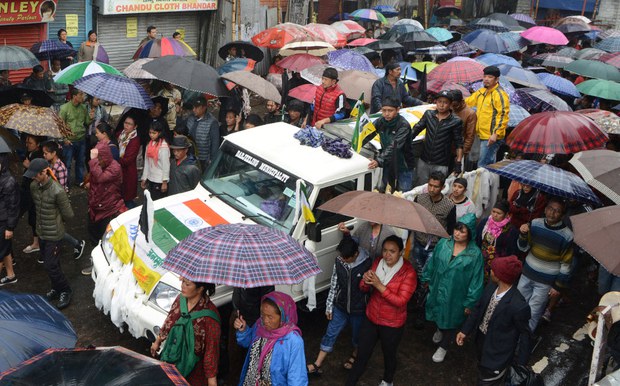India: Gorkha Separatists Suspend Darjeeling Shutdown
2017.08.31
Kolkata and Guwahati
 Indian supporters of Gorkhaland march during a rally in Darjeeling, West Bengal, in memory of activists killed in clashes with police, July 9, 2017.
Indian supporters of Gorkhaland march during a rally in Darjeeling, West Bengal, in memory of activists killed in clashes with police, July 9, 2017.
A crippling strike by Nepalese-origin residents of the hills of West Bengal calling for a separate Indian state will be suspended for 12 days starting Friday, an official of a political party spearheading the shutdown said Thursday.
The nearly three-month strike in Darjeeling, a popular hill station with a large Nepalese population, was called off temporarily following a meeting between the leaders of the influential Gorkha Janmukti Morcha (GJM) and West Bengal Chief Minister Mamata Banerjee on Tuesday, GJM convener Binoy Tamang told BenarNews.
The decision to suspend the strike until Sept. 12, when the GJM is slated to meet Banerjee for a second round of talks, was taken to “honor the state government’s response to having dialogues,” Tamang said.
The protests erupted on June 8 after West Bengal’s ruling Trinamool Congress (TMC) party decided to make the Bengali language mandatory in the state’s classrooms.
“First priority is peace. This will help us hold a congenial round of talks with the government,” Tamang said.
“Shops, markets, offices and schools will re-open and transport will be plying from 6 a.m. tomorrow (Friday),” Tamang said.
Some senior GJM members were opposed to suspending the violent strike, which has killed nine people and left the 130,000 population of Darjeeling short of essential supplies.
“The decision has no legitimacy. The bandh (shutdown) will continue,” GJM president Bimal Gurung said in a statement released from an undisclosed location.
Gurung is accused of masterminding explosions during the strike to target security forces and is reported to be in hiding.
“The decision to withdraw the strike was not taken by the party president Gurung. The strike will continue,” senior GJM member Roshan Giri told BenarNews. He urged his colleagues in favor of withdrawing the strike to not forget their decades-old goal of a separate Nepalese-speaking Gorkhaland.
Residents confused
The contrasting statements by Gorkha leaders caused confusion among Darjeeling residents who were unsure whether the strike had actually been called off.
“It is true our main demand is for a Gorkhaland separate from West Bengal, but the people are suffering due to this strike. The decision to withdraw the strike is a major relief. But because of the conflicting statements coming through, we are confused if the strike is still on or not,” Sarita Chetri, a university student in Darjeeling, told BenarNews.
Ranu Gurung, a Darjeeling-based tour operator who claimed to have suffered massive losses from the strike, said the prolonged violent agitation for a separate state bore no fruit.
“The common public has gotten fed up with such a long agitation that produced no result. It is clear the people want a break to give the movement a fresh direction,” he told BenarNews.
India’s almost 5 million-strong Gorkha population has been demanding separation from West Bengal for more than a century.
While welcoming the decision to suspend the strike, West Bengal Tourism Minister Gautam Deb credited Banerjee for single handedly resolving the impasse.
“It was her [Banerjee’s] idea to meet with the Gorkha leadership, and it has paved the way for the lifting of the shutdown,” Deb told BenarNews.
“It is a very good decision by the GJM to end the strike because the lives of the common residents of Darjeeling were getting severely hampered – schools, colleges and markets have remained closed for over two months. It is imperative that we urgently normalize the situation,” Deb added.
But an analyst saw TMC’s stance with skepticism.
“No doubt, a dialogue is the best way forward. But I hope the TMC government is not playing politics to create fissures within the GJM. It is easy to break a movement temporarily but finding a permanent solution is difficult,” Bidhayak Das, who specializes in the studies of conflict and peace in South Asia, told BenarNews.







